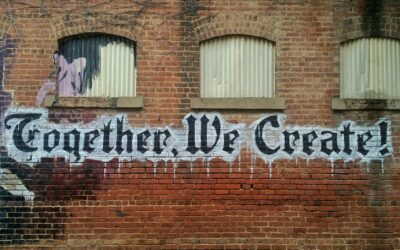In 2020, we have had highs and lows in the world when it comes to #BLM and #Indigenous rights. It is often a hard space for an Indigenous person to traverse through with the questions that may come your way.
I am (currently) the only Indigenous business advisor for Creative Plus Business, and we joke that my title here is Jeton Moll, a pun on the word Jeton, which is French for token. I use it as my name, as the outside world will sometimes think that the only reason Monica (the C+B Doyenne) hired me as a business advisor was because I was Indigenous, which is so not the case for the role I have at Creative Plus Business. But I know my lens is different and as a true ally Monica respects that difference and has allowed me to thrive in the space of advising in a way that gives me faith that we can make the changes to make places and spaces culturally safe for everyone we connect with, clients and staff alike. It is also about being able to voice concerns and bring changes together for the company to be better at our jobs and the people we work for and support in the creative industries.
Last year we had a moment where we both had to reflect on the role of being diverse in this space. When George Floyd was killed and the Black Lives Matter movement began in the United States, like many other countries, it triggered a movement of protest here in Australia. At the same time, the voice of the Aboriginal Deaths in Custody rose up, because a young Dunghutti man at the forefront of our Indigenous community died in similar circumstances and uttered the same final words of “I Can’t Breathe”. He was one of the many other men and women, whose inquests still have not been heard, with no action been taken towards the police. This fight is not a new one. The walking of the streets in my youth for the different treatment of our men and women in custody led to the Royal Commission in the early 1990s, and 30 years later we are still asking for changes that were recommended and few enacted. We also go into carer mode now that we have young nephews and nieces, who feel the weight of their community and don’t know how to react. They want change and we want them to live a life that allows them to express themselves without the fear of harm during peaceful protests. The fact that I no longer show my rage does not mean I don’t feel the rage and the generational trauma placed on my people since colonalisation.
As a part of this story, Monica asked me to help with the work on what needs to be done for Creative Plus Business to be better allies to the cause. For her, it was a simple question, and for me, it was layered with the weight of a constant question — why do Indigenous people need to deal with the trauma and find a way for non-Indigenous people to engage?
So said to Monica, “I need time to breathe. For you, it might be a movement and the 323* Indigenous people that have died in custody might be just a number. But for me, I knew some of those people. One was an uncle, one was a cousin, and one was a friend. I am happy to help, but right now I need to sort out the grief in my head and to be there for the young ones as they sort through how they are feeling.”
Monica was horrified that she didn’t think of the weight I was carrying and was so apologetic that she had put extra weight on me to be her answer for her and the company going forward. We had a great conversation after that moment where we talked about allyship and how lucky we are that we both respect each other. I knew she meant no harm in her ask and she was able to hear my need for space and to be considerate of each other and our motivations for the need to be there for each other.
From this conversation and the ones that followed, we crafted a map of what true allyship looks like for us. This type of work is not one way. Both sides need to be carefully traversing a safe space for people to work, especially now that we have a lot of isolation in our lives and our usual sense of community at work can feel empty as we have worked from home more and more throughout this pandemic. Now that we’re reentering community workspaces and creative spaces, it is the perfect time to re-energise our teams and see the strengths in the differences within the teams we flourish within.
Allyship has a positive and sustainable impact on our workforces and as individuals, we play a role in the collective experience. In one way, the term ‘ally’ has had a stereotype or token identity, a badge if you rather. I prefer to think of allyship as disrupting oppressive spaces by education. With this in mind, your motivations towards allyship and diversity have to be put under the spotlight first.
Ask yourself:
1. Is my interest derived from the issue trending?
2. Am I doing this to meet a quota or increase in funding?
3. Am I hijacking the message and inserting my views, rather than respecting those voices and views of the Indigenous/ Cultural community?
I have my own internal checklist:
1. What steps can I personally take to amplify marginalized voices that are too often silenced?
2. What do I have and how can that be leveraged?
3. How can I use new learnings in my everyday life?
4. How can I use my position and privilege to listen, shift power dynamics and take steps towards reconcile-action?
These are big concepts and can weigh you down, but can also liberate you when you see our youth thrive with your support of their voices and the change they want for their future. Allyship can help them to have open minds and freedom in thought but deep respect for the past and history that they continue the footprints of.
Here’s my 10 Point Plan to Allyship:
1. Be critical of your motivations — allyship is not a trend.
2. Acknowledge that you walk on land that has many nations already on it and that they have never ceded their sovereignty.
3. Acknowledge that the conversation is not about you.
4. Keep learning, through books, films, and people.
5. Engage with the cause by participating in protests, conversations, and campaigns where you can hear the views of the people you are supporting.
6. Speak up — help elevate voices that are being oppressed.
7. Transfer benefits of privilege through mentorships and internships and take time to see what lens they are looking through and what their priorities are.
8. Maintain cultural competency for your organisation.
9. Create protocols. Many arts organisations have protocols about working with Indigenous people.
10. Support Indigenous businesses when you can.
*323 Indigenous deaths in custody at the time of the conversation. This number has since risen to 440.





Hi Pauline, thank you for your generosity in showing me, as a non-Indigenous worker at C+B, how to be an ally to Indigenous Australians through role modelling, honesty and intellectual rigour. As a an advisor and coach, it is key for me to engage in my own self-reflection, and to shine a critical lens on my motivation, intentions and the impact of my action. Thank you again dear colleague.
Thanks for your kind words, Kylie! We’ll be sure to pass them onto Pauline — she is a true asset to our team and we are very lucky to have her.
Love this thank you
You’re welcome, Sarah!